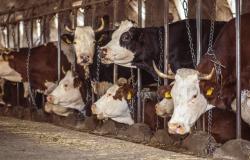Rome, 8 April 2024 – Ursula von der Leyen he hasn’t had an easy few weeks. The president of the EU Commission, running for re-election, is under pressure for alleged irregularities in the common purchase of vaccines and for the appointment of Markus Pieper as EU envoy for SMEs, despite the fact that he was the worst among the pre-selected candidates and that the responsible commissioner, Thierry Breton, had recommended another name. But the outgoing president still seems to have the strength to sound the last charge and she did so at the meeting of the European People’s Party in Athens with a speech that heralds a turn to the right.
This approach based on security, combating immigration (“We decide who enters Europe”), investments in defense, slowing down environmental policies, seems inevitable since the EPP does not want to be crushed by the growth of conservative parties and the far right. Von der Leyen thus tries to prevent the movement of moderate voters towards these parties, although naturally the national factors of each country come into play. The message is clear: you can be pro-European like the popular ones, in favor of further European integration in some sectors, but at the same time promoting right-wing policies on immigration, security and the environment. Von der Leyen takes this position in the house of another possible EPP candidate for the presidency of the Commission, Greek Prime Minister Mitsotakis. It is as if the president is trying to pin the party to her political position, the Spitzenkandidat may become someone else, but the line is drawn. Von der Leyen was categorical on another point and that is no alliance with pro-Russian parties, such as Front National, AfD, Lega, Fidesz. Translated: there can be an alliance with conservative parties like Brothers of Italypro-Atlantic who support Ukraine, excluding the extremes.
It is, after all, the strategic game of Prime Minister Meloni: inserting oneself in the space between the popular and the conservatives, acting as a glue, with the strength of the government of a large country, ensuring the popular votes to elect the president and forming a Commission that is more skewed to the right. Of course, if von der Leyen were rejected after the European elections and another EPP candidate emerged, the negotiations to form the new Commission would perhaps be more difficult for Meloni, given the good relationship with the outgoing president, but in any case for the EPP it would not it will be easy to avoid a relationship with the conservatives, precisely because they have stolen many votes from them in recent years and can continue to do so.
Going back to being only centrists and signing an exclusive relationship only with liberals and socialists risks being an electoral boomerang both in Brussels and in national contexts. Instead a collaboration with the conservatives potentially has two positive values: strengthen the pro-Ukrainian position and investment in defense and split the right front, avoiding welding between conservatives and anti-system nationalists. Von der Leyen’s path may be stopped by allies and internal adversaries, but changing the position of the EPP that she has designed will be difficult for any other possible candidate for the presidency of the Commission.





